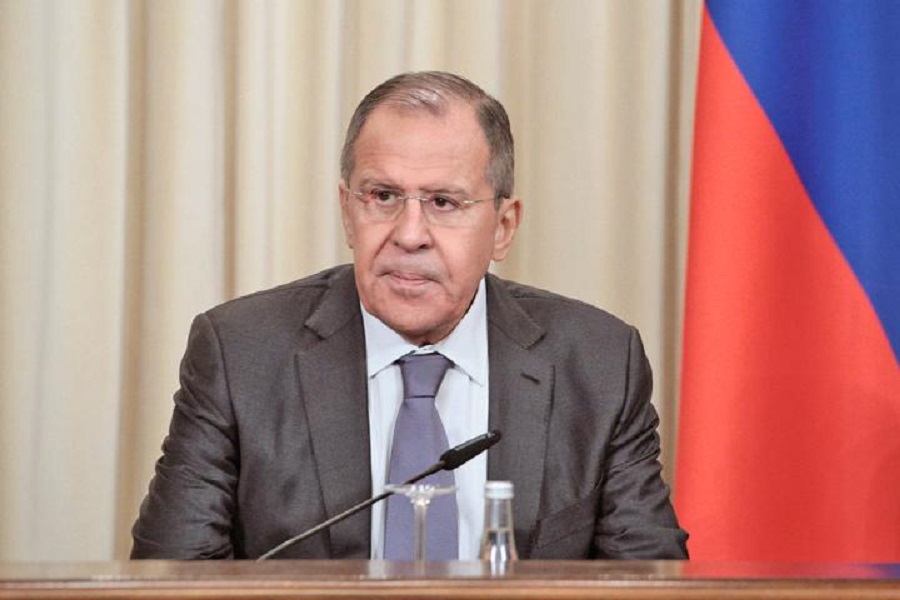Foreign Minister Sergey Lavrov’s interview with Belarusian television network RTR Belarus,
December 2, 2017
____________________________________________________________________________________________________________________________________
Question: Mr Lavrov, let us talk about military and political matters, which are the reason for your visit to Minsk. Do you think the Collective Security Treaty Organisation (CSTO), which is celebrating an anniversary, has become a weighty alternative to NATO in the post-Soviet space?
Sergey Lavrov: First of all, I do not think that the CSTO is a purely military and political topic. It also refers to a large-scale integration policy and is designed to protect all aspects of security in our big common space, including protection against terrorism, drugs and crime.
The date is indeed impressive: 25 years of the Collective Security Treaty and 15 years of the Collective Security Treaty Organisation, which has reached the age of maturity, as I see it. We have achieved visible and impressive progress in the overwhelming majority of areas that were outlined by the heads of the member states.
As for comparing the CSTO to other military-political blocs and organisations, I see no reason why we should try to match NATO. We have different goals. Actually, NATO is being kept alive artificially. The bloc has lost its meaning with the dissolution of the Soviet Union and the Warsaw Treaty. Our overseas partners maintained the military-political elements of the North Atlantic Treaty Organisation primarily to keep hold of the levers of influencing Europe. This is obviously true. Any political analyst has known this for a long time.
Take the subject of Afghanistan, which gave the meaning to the preservation of NATO for decades. When this theme was exhausted, they needed to invent something else. And they looked at the Russian Federation as a country that upheld its interests in close interaction with its allies in a historically common space. This provoked their displeasure, primarily over the fact that we refused to accept the fact of NATO violations of the agreements we reached in the 1990s, such as that security is indivisible and that NATO will not expand eastward, and a later compromise agreement under which NATO’s eastward expansion will not involve the deployment of military forces in the new member states. All these agreements have been trampled on by NATO, which faced all of our neighbours with a choice between Russia and the West. We can see the results of this policy in Georgia and Ukraine.
I strongly hope that the CSTO will not do the same. We do not blackmail or present ultimatums to anyone. We are concerned about the security of the CSTO member states. We have enough problems at home, and we are not eager to play geopolitical games.
Question: Judging by the reaction to the latest Russian-Belarusian military exercise, the West is worried by our close military cooperation. Is Russia concerned about or alarmed by the Belarusian participation in the Eastern Partnership programme?
Sergey Lavrov: Speaking about the military manoeuvre, the West is not so alarmed as it is trying to use this exercise as a pretext for whipping up tension. Belarus and Russia notified the signatories of the OSCE Vienna Document on Confidence and Security-Building Measures about the planned exercise in due time. We sent the notifications in due order and invited observers, which was more than we were obliged to do. Everyone who wanted to has attended these exercises and has confirmed the complete transparency of our actions. But our American colleagues and the other NATO countries used the hysteria to deploy additional military forces and equipment in the Baltic countries as well as in Poland. They have made use of the pretext, and although their fears have not been confirmed, the deed has been done and the case is closed.
As for the Eastern Partnership, we do not tell others how to live their lives. We have a partnership agreement with the EU, which has been suspended through no fault of ours. We have never doubted that all our neighbours and friends want to have good relations with their partners in the West, the East, the South and the North.
We are aware of some EU countries’ desire to use the Eastern Partnership for anti-Russia purposes. These countries do not constitute a majority, but they are rather aggressive. The latest example is the speech delivered by UK Prime Minister Theresa May at the Eastern Partnership Summit in Brussels just a few days ago. The majority of the EU countries see this as yet another futile attempt and that adding anti-Russia sentiments to relations with the CIS countries is counterproductive as well as useless. We appreciate the firm stance taken by Belarus and some other members of the Eastern Partnership programme against these attempts. The summit’s final declaration does not include anything that has no connection to the target countries’ relations with the EU, contrary to the desire of some summit participants and thanks to the efforts of other countries, including Belarus, which prevented the addition of political and ideological elements to this process because they see it as an opportunity to promote normal relations with Western Europe. I believe we see eye-to-eye on this.
Question: No sore spots?
Sergey Lavrov: We have no doubts or any suspicions about Belarus, Armenia or Azerbaijan. Of course, we also see what our Ukrainian, Moldovan and Georgian colleagues are doing. But despite all this, as I have said before, we are sure that they won’t succeed in pushing the Eastern Partnership system in an anti-Russia direction.
Question: What do the Russian leaders think about the efforts taken by Belarus to help settle the situation in Ukraine? Was the Belarusian initiative unexpected? Was it coordinated with Russia, or was it an impromptu decision?
Sergey Lavrov: When President of Belarus Alexander Lukashenko proposed Minsk as the dialogue venue for the Normandy format, which developed in June 2014, we supported this idea immediately. There is no sense in talking about whether it was a coordinated decision or not. It was done wholeheartedly, and Russia, Ukraine, Germany and France supported this initiative immediately. I remember the 17 hours we spent talking without respite in February 2017, which produced the Minsk Package of Measures for the settlement of the Ukrainian crisis. The UN Security Council approved the package very quickly, and there is still no alternative to this solution to the Ukrainian crisis. It is another matter than not all provisions from this document are being fulfilled. I think we will keep working, including in Minsk as the venue for the Contact Group’s talks, which will resume soon at the level of aides to the leaders of the Normandy format countries.
Question: This week’s breaking news is that North Korea has launched yet another nuclear-capable intercontinental ballistic missile, which can reach Japan, the United States, South Korea and Russia. The United States, Japan and South Korea raised the alarm and called an extraordinary meeting of the UN Security Council. What should Russia and the CSTO do in this situation? Should the CSTO be concerned about the situation on the Korean Peninsula?
Sergey Lavrov: In principle, the CSTO has a common stand on this matter. We do not accept North Korea’s claim to the nuclear status. All the CSTO countries support UN Security Council resolutions and comply with its sanctions against North Korea. At the same time, the CSTO countries call for abandoning warlike rhetoric, threats and insults and for looking instead for a way to resume talks.
As for the latest missile test in North Korea, I can say that the country’s leader has refrained from taking any opportunistic actions for over two months. Back in September, our American colleagues hinted that the next large scale military exercise would be held near the Korean Peninsula no sooner than next spring. The underlying idea was that if Pyongyang did not disrupt this natural pause in the schedule of US-South Korean exercises, this could be used to create conditions for a dialogue. We said we appreciated this idea. We also worked with Pyongyang. Quite unexpectedly, two weeks after the Americans’ hint they announced the decision to hold extraordinary military exercises in October and November. They have recently announced that the regular manoeuvres will be held in December. This looked like an attempt to provoke Kim Jong-un into breaking the pause. We condemn Pyongyang’s opportunistic nuclear missile plans, but we also disapprove of the provocative conduct of our American colleagues. It is deeply regrettable that they are trying to pull along Japan and South Korea, which, as you said correctly, will be the first victims of a war on the Korean Peninsula.
Question: These comments may frighten some of those who plan to attend the Olympic Games in South Korea. Do you think the games may be cancelled?
Sergey Lavrov: It appears that the Americans are not thinking about this. South Koreans are clearly worried about the games. They have said this openly in connection with the developments on the Korean Peninsula and with provocations against Russian athletes.
Question: You are a football fan and surly monitor all the events connected with the 2018 World Cup. Who will win the title?
Sergey Lavrov: The strongest team. I want to watch some good football.
* * * * *
Zdroj a ilustračné foto: http://www.mid.ru/ru/press_service/minister_speeches/-/asset_publisher/7OvQR5KJWVmR/content/id/2975550?p_p_id=101_INSTANCE_7OvQR5KJWVmR&_101_INSTANCE_7OvQR5KJWVmR_languageId=en_GB







